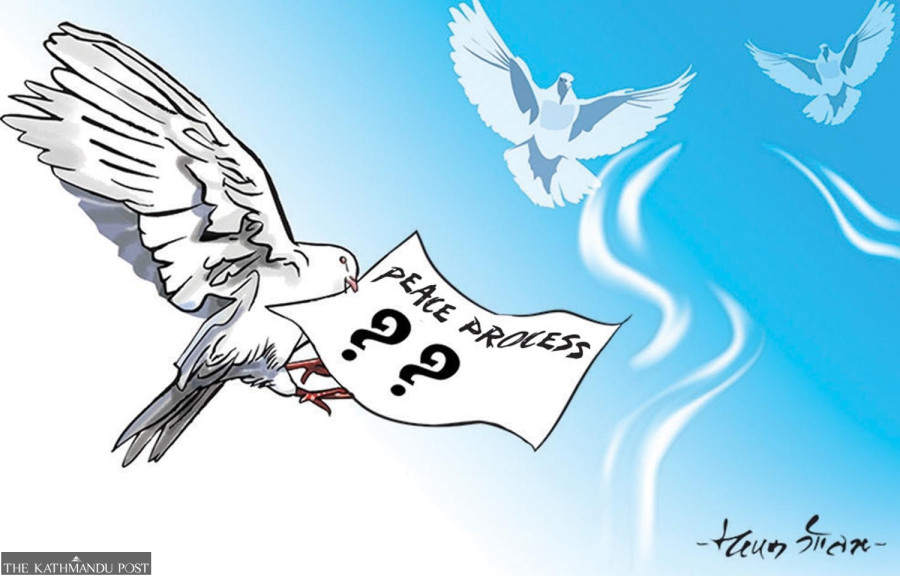National
Nepal bill says murder is not serious rights violation
The government registers the new bill at the Parliament Secretariat to amend controversial transitional justice law.
Binod Ghimire
The government on Thursday brought a bill to amend the Enforced Disappearances Enquiry, Truth and Reconciliation Act retaining most of the “controversial provisions” from the previous bill that couldn’t get through the parliament last year.
The Ministry of Law and Justice registered the bill at Parliament Secretariat following a Cabinet nod on Thursday morning. The new bill, like the previous one, hasn’t listed murder as a serious human rights violation, thereby leaving it as a crime fit for amnesty. It has instead listed cruel murder or murder after torture, rape, enforced disappearances and inhumane or cruel torture as serious rights violations. Those involved in serious rights violations will get prosecuted and not be considered for amnesty.
Murder, sexual violence, physical and mental torture, extrajudicial custody and other crimes, however, have been listed as cases of violations and are amnestiable if the victims give their consent. The amendment bill drafted by the erstwhile Sher Bahadur Deuba government in July last year had the same provisions which met with severe criticism from national and international quarters. The government didn’t table it for voting fearing a backlash.
Eight months later, the government has brought a ‘new bill’ but without revising the controversial provisions.
Suman Adhikari, the founding chair of the Conflict Victims Common Platform, whose father was killed by the Maoists during the insurgency, said the government has shown that it is least bothered about victims’ concerns. “The government wouldn’t have registered the same bill with the same controversial provisions if it cared about us. It is clear that this government wants to steamroll the bill through parliament,” Adhikari told the Post.
Human rights activists find problems in the categorisation of crimes. Mandira Sharma, a senior international legal adviser to the International Commission of Jurists, said there must be prosecution even in cases of sexual violence, torture and murder as per the international law. “Several provisions in the bills are not in line with international and domestic laws. It is a reflection of a deep-rooted culture of impunity in our political leadership,” Sharma told the Post. “There is an illusion among our leaders that they are free to make any sort of law they like.”
The victims of the 10-year insurgency and human rights defenders say the only positive part in the bill is the provision allowing appeal of the decisions of the Special Court at the Supreme Court.
A Special Court will be constituted to hear the conflict-era cases of atrocities, as per the bill. The earlier bill, prepared last year, said the decision of the Special Court would be final, with no provisions for appeal, which was heavily criticised.
The new bill says a separate bench will be constituted at the Supreme Court where victims can challenge the decisions of the Special Court.
However, human rights experts say the provision relating to the composition of the Special Court is faulty. The court, as per the bill, will have three high court judges selected in consultation with the Judicial Council.
Sharma says the clause “in consultation with the Judicial Council” is flawed and leaves room for wrongdoing. The bill should clearly state, she adds, that judges shall be recommended by the council.
The provision of “in consultation with” was kept to handpick judges, she added.
Despite demands from various quarters, the bill doesn’t talk about war crimes like use of children as combatants or mass murder by the state and by the then rebel Maoists.
“The government rushed the bill to show the world that it is eager to conclude the transitional justice process. But this bill will not give justice,” Charan Prasai, a human rights activist, told the Post. “This is unacceptable. It shouldn’t be endorsed in its present form.”
Some provisions in the bill, say victims, are even more regressive than those in the previous bill. The new bill has ditched the provision of automatic suspension of a person who holds a public position, if a case is lodged against him or her in a court.
Lack of proper law is one of the many reasons the transitional justice process has been stuck even 17 years after the signing of the Compressive Peace Accord. In 2015, a Supreme Court full bench led by Justice Kalyan Shrestha had struck down the amnesty provisions in the Act, directing the government to amend the law. However, no government was serious about revising the piece of legislation in line with the international laws and practices and earlier apex court verdicts.
The bill registered on Thursday gives two years to the Truth and Reconciliation Commission and the Commission for the Investigation of the Enforced Disappeared Persons to complete the investigations. “The bill doesn’t envision further extending the terms of the commissions. We believe two years are enough for investigations,” said a joint secretary at the law ministry.
However, human rights defenders don't think two years would be enough for investigating all cases.
The truth commission has received 63,718 complaints, while the number of cases at the disappearance commission is far lower—just 3,223. But the disappearance commission is investigating only 2,484 cases, saying the others do not fall under its jurisdiction.
The bill is likely to be tabled in the House at the next meeting of the House of Representatives on March 19.
“The bill must be amended by removing problematic provisions before it gets endorsed by the House. The victims will not gain by a process based on a law with faulty provisions,” said Adhikari.




 9.6°C Kathmandu
9.6°C Kathmandu














